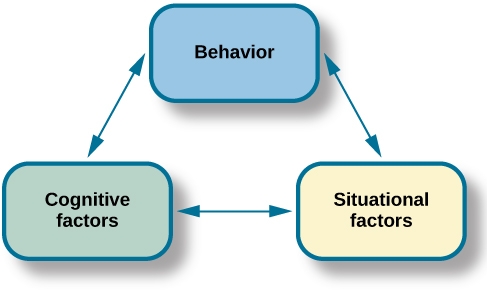Bandura explains human behavior in terms of a dynamic three-way reciprocal model in which personal factors environmental influences and behavior continually interact. Thinkers that support this theory believe that to understand personality we need to consider the situation were in and our thoughts.

Social Cognitive Theory Trait Theory Psychology
And b that people are best understood in terms of conscious cognitive capabilities that enable them to symbolically represent events to reflect upon themselves and to act as agents of their own development.

. We review their content and use your feedback to keep the quality high. Describe the social cognitive perspective on personality. According to the theory individuals are social things That can learn from the environment.
The theory views people as active agents who both influence and are influenced by their environment. A major component of the theory is observational learning. The process of learning desirable and undesirable behaviors by observing others then reproducing learned behaviors in.
1 Definition of Social Cognition. Social-cognitive perspective on personality is a hypothesis that underlines cognitive cycles like reasoning and deciding in the improvement of personality. Social Cognitive Theory considers people to be active agents who both influence and are influenced by their environment.
Social cognitive theory was developed by Stanford psychologist Albert Bandura. Social-cognitive perspective views behavior as influenced by the interaction between peoples traits including their thinking and their social context. He argued that reinforcement does not simply work as a mechanism but it is actually the provider of information of the next reinforcement to be given once the behavior is repeated.
In contrast to the psychodynamic approaches of Freud and the neo-Freudians which relate personality to inner and hidden processes the learning approaches focus only on observable behavior. By this it means that people can learn what is good and resist that which is terrible. According to the theory it articulates that Personality is something that an individual can learn from people.
Up to 24 cash back The Social-cognitive perspective is a theory that combines research on learning social behavior and cognition. In Banduras experiment children were shown a video of an adult hitting kicking and tossing a life. And c the influence.
This illustrates one significant advantage of the learning approaches over psychodynamics. Experts are tested by Chegg as specialists in their subject area. A that the psychological person the environment and behavior reciprocally influence one another.
Social cognitive theory is based upon two key principles. The term causation is used to mean functional dependence between events. Albert Bandura expanded cognitive personality theory by describing processes of observational or vicarious learning and the role of belief structures such as self-efficacy.
These goals are reflected in the study of a cognitive mechanisms that may explain social cognitive processes as illustrated above. The social-cognitive perspective applies principles of learning cognition and social behavior to personality with particular emphasis on the ways in which our personalities influence and are influenced by our interaction with the environment. Bandura pointed out that.
B the content and structure of social knowledge. The social-cognitive perspective on personality is a theory that emphasizes cognitive processes such as thinking and judging in the development of personalityThese cognitive processes contribute to learned behaviors that are central to ones personality. The Social Cognitive Theory of Personality.
Bandura agreed that people develop and change as a consequence of the direct rewards and punishments they receive from the environment. Social cognitive theory has its roots in a famous experiment done by Albert Bandura in 1961. Reciprocal determinism refers to the interacting influences between personality and environmental factors.
In this model of reciprocal causality internal personal factors in the form of cognitive affective and biological events. State the social-cognitive perspective on personality and describe the concepts proposed by the two most influential theorists in this field. The social-cognitive perspective applies principles of learning cognition and social behavior to the understanding of personality.
In his social cognitive theory of personality Bandura included the concept of observational learning as one of the main theoretical points. The social cognitive perspective of personality theorizes that human personality is an ever-changing amalgamation of the choices we make based on how we think about and judge the actions of others. These cognitive cycles add to learned practices that are key to ones personality.
Banduras Social Cognitive Theory. This theory is based on the fact that we learn by observing and modeling the behavior of others. Social cognitive theory explains psychosocial functioning in terms of triadic reciprocal causation Bandura 1986.
The basic goal of a social cognitive perspective is to understand how individuals make sense of themselves others and events in everyday life.
Social Cognitive Theory Of Personality Mnemonic For Mcat

Social Cognitive Perspectives On Personality Boundless Psychology

Social Cognitive Perspectives On Personality Boundless Psychology
0 Comments